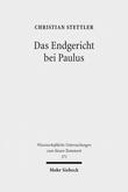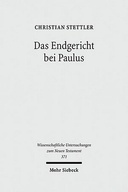Explore

In the 'New Perspective on Paul' the last judgment does not play any decisive role. According to other Pauline scholars, Paul, in his many fragmentary references to a last judgment, did not presuppose a consistent conception of judgment, but instead used different and sometimes contradicting motives in different contexts. Christian Stettler counters these views from a cognitive semantic perspective. Since in frame semantics language is seen as an 'access point' to encyclopaedic cognitive concepts, the author argues that judgement texts are references to a more detailed concept of the last judgement that Paul presupposed in his letters and taught in his churches. Stettler offers a full reconstruction of this concept by a semantic analysis of all relevant passages and through more extensive interpretation of central texts. The result is a reading of Paul that offers a way forward both to New Perspective and traditional confessional readings.
This book is made open access as part of the Knowledge Unlatched KU Open Services
This book is made open access as part of the Knowledge Unlatched KU Open Services
This book is included in DOAB.
Why read this book? Have your say.
You must be logged in to comment.
Rights Information
Are you the author or publisher of this work? If so, you can claim it as yours by registering as an Unglue.it rights holder.Downloads
This work has been downloaded 237 times via unglue.it ebook links.
- 66 - pdf (CC BY-NC-ND) at OAPEN Library.
- 109 - pdf (CC BY-NC-ND) at Unglue.it.
Keywords
- Judgment
- KUnlatched
- Last Judgment in Paul
- Paul
- Theology & Religion
Links
DOI: 10.1628/978-3-16-155204-5Editions


